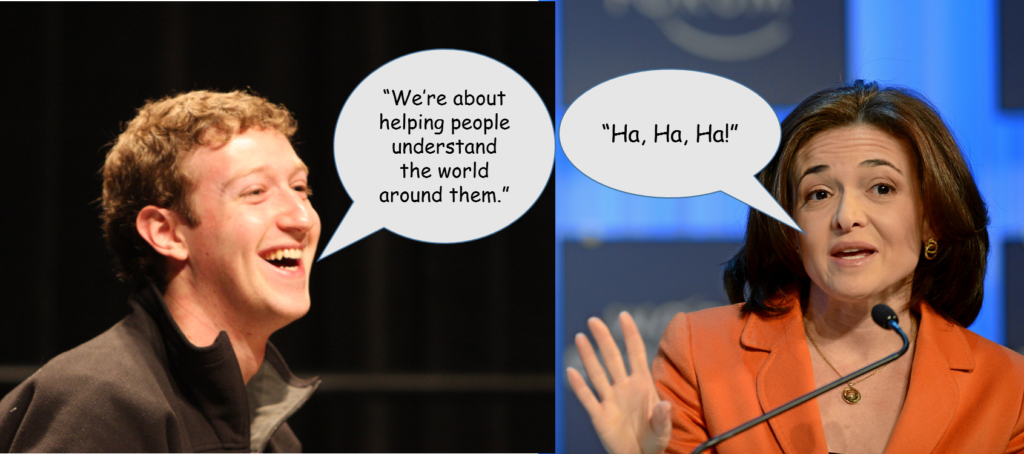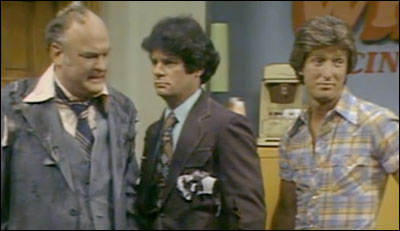 Many mavens, pundits, and analysts in the worlds of media and politics are trying to understand what’s going on at Facebook. Has the company wantonly used our data to sell its advertising to nefarious groups and organizations? If you’re on Facebook, do you really have any privacy? And what is Facebook – a social portal where people interact with each other OR one of the best targeted advertising machines in the world?
Many mavens, pundits, and analysts in the worlds of media and politics are trying to understand what’s going on at Facebook. Has the company wantonly used our data to sell its advertising to nefarious groups and organizations? If you’re on Facebook, do you really have any privacy? And what is Facebook – a social portal where people interact with each other OR one of the best targeted advertising machines in the world?
That last question is the key. And in fact, it describes a quandary that’s been brewing inside Facebook for about a decade. It’s the push/pull of “mission” vs. revenue.
But if you want to understand what’s really going on at Facebook, just walk down the hall.
For people in radio, it’s a familiar battle that just about everyone’s faced at one time or another:
Programming vs. Sales
A revealing article in Time by David Kirkpatrick – “The Facebook Defect” – brilliantly defines the internal struggle taking place inside the world’s most powerful social network.
Think of Mark Zuckerberg as Facebook’s program director. But in fact, it might be even more accurate to think of him as the creator of the social media format – a guy who justifiably feels a strong sense of ownership to the place where billions are spending their time every day.
He has actually stated, “I never wanted to run a company.” And it’s been Zuckerberg’s stated goal to help make the world “more open and connected.” That doesn’t sound much like a targeted advertising juggernaut. It sounds more like a food co-op.
Zuckerberg is a product guy with a big vision that his creation should be a meaningful force in people’s lives. And in fact, he continues to deny the notion that Facebook is a media company. Perhaps Facebook doesn’t create content of their own, but they sure distribute a lot of our material.
And enter Sheryl Sandberg, Facebook’s COO. She’s been on board for exactly a decade. But her vision of Facebook is quite a bit different than Zuck’s. According to her, “The revenue model is advertising. This is the business we’re in, and it’s working.”
Perhaps a better job title for her would be Facebook’s DOS.
And so, it’s become that all-too-familiar, classic tug of war between programming and sales at Facebook.
Shareholders demand a business model fueled by increasing revenue and even larger profits. That sounds like much of what the radio industry endured decades ago – the struggle between two often conflicting  agendas inside stations – commercial or public. (In public radio, commercials are called “credits,” advertisers are called “underwriters,” and sales managers are known as “development directors.” It’s the same thing.)
agendas inside stations – commercial or public. (In public radio, commercials are called “credits,” advertisers are called “underwriters,” and sales managers are known as “development directors.” It’s the same thing.)
And so it will come as no surprise to you that Kirkpatrick refers to “two distinct camps” inside Facebook. Zuck’s disciples are product people who share his vision about connection. Sandberg’s wing of the building is all about advertising, but many are made to feel subservient to the product team.
Zuckerberg views Facebook’s data as a way to stitch together and build communities.
Sandberg sees it as a tool to sell more advertising.
But now that Facebook’s Zuckerberg and Sandberg are being scrutinized – and dragged in front of a showboating Congress – there are questions to be answered about whether its sales unit has gotten too big, too unwieldy, and too out of control. In its pursuit of revenues and profits, what sacrifices with its member data has it taken – and how does this impact perceptions, and ultimately, usage?
And as is the case in radio, a balance between the two programming/sales spheres is the only model that works in the long haul. I worked for a very successful PD once who got so fed up with his predatory, conniving sales team that he built a “line of death” across his office doorway, banning any reps from crossing the threshold. (Actually, it was a strip of duct tape.)
Too many commercials, too many bad commercials, daily remotes, and too many live reads are all part of the excesses that eventually come back to bite programming – and of course, the measurement mechanism that sets ad rates – the ratings. At a certain point, the scale tips, making the business model untenable.
As a former programmer, I had my regular battles with salespeople and sales management, too. But that was back in the ’80s. When my brother Paul joined the company a decade later, we identified ourselves respectively as “programming and sales.” But as we learned over the years, the system only functions when programming develops true empathy for sales, while sales needs to respect and value the content.
Paul has taken on a stronger appreciation of the value of the product. I most certainly have developed a higher respect for sales and marketing.
 Facebook has many issues as it finds itself in the crosshairs of Congressional hearings, as well as increased scrutiny by its own users.
Facebook has many issues as it finds itself in the crosshairs of Congressional hearings, as well as increased scrutiny by its own users.
But ultimately, like radio stations, it will have to work out its own internal struggles – decide what it is, and what problem it is trying to solve. And then establish limits – not unlike spotloads, copy standards, and all the other machinations broadcasters have wrestled with forever.
Radio operations know government and politics are a fact of life in their business concerns. From the FCC to Congress to the President, there are i’s to dot and t’s to cross. And a major role at the NAB is helping its members navigate those waters, and the legislation that needs to be passed – or killed.
At Facebook, Zuckerberg and Sandberg are rapidly coming to grips with a similar reality. And solving the problem will start with addressing their own programming vs. sales struggles.
Special thanks to my “assignment editor,” Harvey Kojan, for the heads-up.
- What To Do If Your Radio Station Goes Through A Midlife Crisis - April 25, 2025
- A 2020 Lesson?It Could All Be Gone In A Flash - April 24, 2025
- How AI Can Give Radio Personalities More…PERSONALITY - April 23, 2025




I read this and it encourages me about radio. Because I think in the best-run operations, circa 2018, the Sales and Programming efforts have become increasingly entwined. We’re doing more and more “commerce” together. I remember the days of separate and contentious Programming and Sales camps. Doing commerce together is much more effective–not to mention a much more pleasant culture to work in. So–YAY for Team-Radio.
Facebook will have to figure it out.
On board with that, Beverlee. I gave a presentation today to a large, enthusiastic crowd at the Oklahoma Association of Broadcasters this morning. And I told them the Facebook story. There were a lot of nodding heads. Thanks for the comment.
Facebook has a PD and a DOS. All it needs now is a great General Manager.
You’re not throwing your hat in the ring, are you, Barry? 🙂
Love your quote “line of death across the doorway”. I was just discussing that subject with an OM last week on how many of us “programming” types had that mentality in our younger days.
Of course anyone that kept that line of thinking was washed out of the business rather quickly as our industry grew.
Great angle & article Fred, love reading your blog daily, keep up the great work.
Appreciate it, Lester. I know a lot of PDs back in the day related to that “line.” We’ve come a long way in bringing the two departments together, something that Facebook will now have to work toward.
Your blogs are among the best reasons to log into LinkedIn. My favorite still is your “Pop Up Radio” article…awesome idea!
Apreciate the comment, Brian. I believe WDHA in New Jersey is actually doing their version of “pop-up radio” and they are very positive about what they’re seeing. Thanks again.